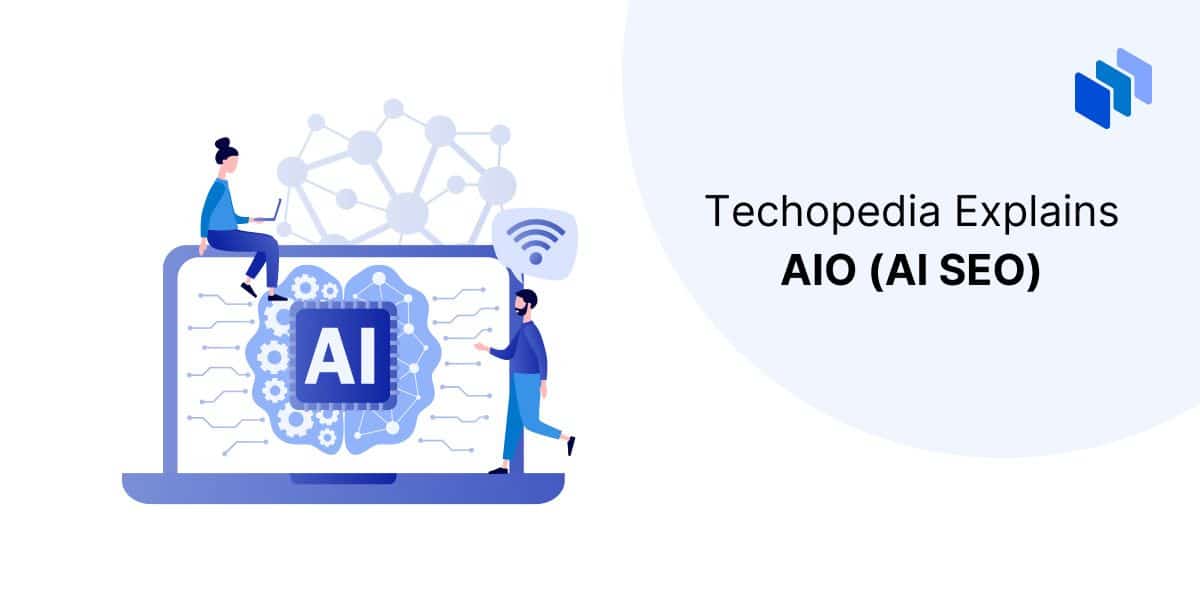What is AI SEO?
AI SEO is the use of artificial intelligence (AI) to enhance search engine optimization (SEO) and help a website or web page rank highly on search engine results pages (SERPs).
SEO is a strategy that seeks to increase the unsponsored, organic search traffic to a particular website or webpage. It requires an understanding of the target audience’s intent and involves competitive analysis, keyword research, link-building strategies, performance tracking, reporting, and making technical improvements to a website’s architecture.
Many of these tasks, which were time-consuming when carried out manually, can now be automated with AI SEO tools.
AI SEO tools, which may also be referred to as artificial intelligence optimization (AIO) tools, use low-level machine learning and sophisticated deep learning algorithms to optimize different aspects of the search engine optimization process and make them easier to execute at scale.
What is AI SEO Used For?
The purpose of AI SEO is to improve a website or web page’s ranking and gain better visibility in unsponsored, organic search engine results.
AI plays an important role in both technical SEO and on-page SEO. Technical SEO focuses on a website’s underlying infrastructure and seeks to ensure the site can be crawled easily and indexed by search engine bots as quickly as possible. It includes factors such as page load speed and mobile-friendliness.
On-page SEO focuses on a specific web page’s content. It includes factors such as keyword research, meta descriptions, and responsive image optimization.
Time-consuming SEO-related tasks that are increasingly being automated with AI include the following:
- Provide content publishers with insight into reader intent for different types of informational, commercial, and transactional audiences.
- Identify competitive web pages and/or competitive websites.
- Crawl a website and flag broken links and other SEO issues that can hurt search engine rankings.
- Identify backlinks to competitive content and evaluate their quality.
- Identify opportunities for internal linking.
- Audit a specific piece of content and provide insights into how to improve the content’s readability.
- Analyze user behavior patterns and make recommendations for next steps.
- Provide marketers with data about search volume for specific keywords to help them monitor market trends through search.
- Alert publishers when there are unanticipated page view drops or sudden rank changes.
- Simulate user interaction to gather information about page load times and other performance metrics that can negatively impact search engine rankings.
Popular Commercial AI SEO Tools
The following AI SEO tools are redefining the way digital marketers and web publishers are approaching search engine optimization. These tools not only simplify complex tasks, they also offer a level of scalability that was previously unattainable through manual SEO research.
- Surfer is a Content Intelligence Platform that uses AI to help blend content strategy, creation, and optimization and make it one process.
- Frase AI can be used to evaluate a website’s overall SEO health and recommend actions to correct potential issues and improve content.
- MarketMuse uses AI to help content teams make data-driven decisions about what content to create, what content to update, and how to do it.
- NeuronWriter is an AI-driven writing assistant and content optimization tool that seems to be especially popular with email marketers.
The Role of Generative AI in Search Engine Optimization
Generative AI tools can also be used to automate many of the processes involved in SEO. For example, ChatGPT and Google Bard can be prompted to provide content creators and web publishers with relevant long-tail keywords for a particular niche topic. Long-tail keywords are highly specific, multi-word phrases that can drive targeted and qualified traffic to a website.
Here are some ways that small businesses and e-commerce vendors can use generative AI prompts to scale their SEO initiatives.
SEO Task
How to Use Generative AI Models
Content Optimization
Use prompts to identify content gaps, recommend optimal content structures, and initiate content drafts.
Personalization
Use prompts to quickly tailor the same content for specific niche audiences. The goal is to improve engagement, which influences search rankings.
Voice Search Optimization
Use prompts to identify conversational queries that are aligned with voice search characteristics.
Link Building
Use prompts to identify the best anchor text for internal links.
Algorithm Changes Adaptation
Use prompts to create a list of AI SEO best practices and search engine trends.
Reporting
Use genAI to create report templates that are tailored to the specific needs and goals of a content creator or publisher.
The Future of AIO
AI SEO is important because it relieves content providers and web publishers from having to conduct their SEO research manually. As artificial intelligence continues to evolve, it’s likely that its role in SEO will only grow. It’s important to note, however, that while AI can significantly augment SEO efforts, it cannot do the job alone.
A human-in-the-loop approach to AI SEO is essential to help ensure that the AI is used as a tool that will augment human intelligence, not replace it.
Ultimately, human oversight remains crucial to ensure content quality and adherence to search engine guidelines and best practices.






